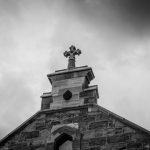Blasphemy is a Crime in NSW

Christianity has had a difficult year.
Putting the Royal Commission on child sexual abuse and proceedings against Christian schools aside, atheists have officially knocked Catholics off their top spot as the country’s most followed belief system.
The Census results are indicative of broader social trends – church attendance is down, and the Church’s stance on social issues is increasingly inconsistent with public opinion.
But before you feel too sorry for the Catholic Church, spare a thought for British comedian Stephen Fry. Irish police recently investigated Fry over allegations of blasphemy, due to comments he made during a television interview.
Among other things, Mr Fry stated that if there is a God, “he” is “utterly monstrous” and “quite clearly a maniac”. As a consequence, Fry was referred to the Irish police for investigation – and could have landed himself a criminal conviction and a fine of up to 25,000 euros.
Irish law make it a crime to publicly utter or publish anything “abusive or insulting in relation to matters sacred by any religion”. Many, including Sinn Fein leader Gerry Adams, have argued for the abolition of the law for years.
Thankfully in the case of Mr Fry, police have discontinued their investigations and won’t be pressing charges.
However, his interview (above) has racked up nearly 10 million views on YouTube and sparked debate about the relevance of blasphemy laws today.
Indeed, blasphemy remains a crime in New South Wales under the common law, although statutory limits have been placed on its scope.
Blasphemy in NSW
The common law prohibition against blasphemy was inherited from the United Kingdom; R v. Ramsay 15 Cox, C.C. 231.
It was upheld in 1987 by the Federal Court of Australia in the case of Rev Fr Walter Ogle and Rev Fr John O’Neill v Janet Strickland.
In that case, the court found:
“The essence of the crime of blasphemy is to publish words concerning the Christian religion, which are so scurrilous and offensive as to pass the limits of decent controversy and to be calculated to outrage the feelings of any sympathiser with or believer in Christianity.”
However, the court also found limitations on the scope of the crime:
“A temperate and respectful denial of the existence of God is not an offence against the law, which does not render criminal the mere propagation of doctrines hostile to the Christian faith”, the court remarked.
“The crime consists in the manner in which the doctrines are advocated. Whether in each case this is a crime is a question of fact for the jury.”
Statutory limitations
Section 547 of the NSW Crimes Act enshrines the limitations on the prosecution of blasphemy, providing that:
“No person shall be liable to prosecution in respect of any publication by him or her orally, or otherwise, of words or matter charged as blasphemous, where the same is by way of argument, or statement, and not for the purpose of scoffing or reviling, nor of violating public decency, nor in any manner tending to a breach of the peace.”
So in essence, it is permissible to criticise Christianity by way of “argument or statement,” but it is a criminal offence do so for a laugh or to incite disdain or ridicule.
Review of the law
In 1994, the NSW Law Reform Commission was asked to consider the relevance of the state’s blasphemy laws.
After reviewing several options – including amending existing laws and extending them to cover other religions – the Commission recommended abolishing the offence altogether.
“Abolition of the offence of blasphemy… is the most commendable option in a modern, pluralistic and secular society,” the Commission found.
“Abolishing the offence of blasphemy would not undermine Christianity, but would be more consonant with the multi-religious, multicultural society in which we live.”
The United Nations Human Rights Committee also recommended the law’s abolition, finding it to be inconsistent with international human rights norms.
Luke Beck, a constitutional lawyer at the University of Western Sydney, believes the main reason for the continued existence of blasphemy laws is the powerful Christian right wing of politics.
As the recent Census suggests, the dominance of the Catholic Church – and Christianity in general – on Australian society is diminishing – and, in the eyes of many, laws which criminalise “scoffing” at any religion are out-of-step with modern secular society.







